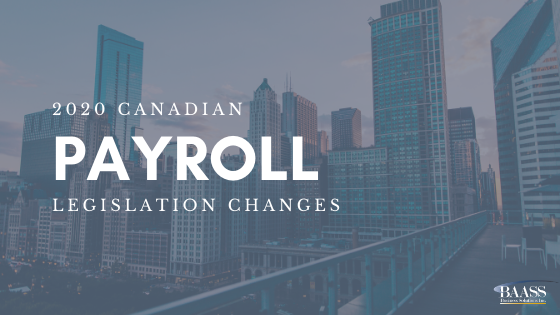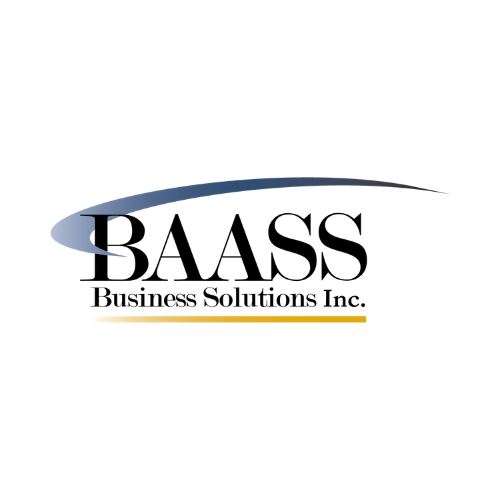
Staying up to date with changing legislation and regulations can be troublesome for busy professionals. With several new rules affecting the 2020 payroll, BAASS has put together a summary of what you need to know.
A discussion took place in 2013 between the Canadian Revenue Agency (CRA) and Revenu Québec in regards to giving larger employers an extended deadline, without penalty or interest, to process the final reconciliatory remittance. The CRA declared the Payment on Filing (PoF) Policy in early 2019, this created further reconciliation remittance deals for the last day of February for the previous tax year (if eligible). This policy has been in place since January 2020 for the 2019 reporting year.
“The government’s approach is a win for both employers and will enable organizations to manage their year-end process effectively and efficiently while saving millions of dollars in interest and penalties”. - Peter Tzanetakis
Revenu Québec later declared an administrative policy permitting employers whose remittance frequency is weekly or twice monthly to remit the final remittance of the year before January 16th of the following year, without penalty. However, employers are subject to pay interest, which is calculated according to their remittance date and frequency.
Canadian Payroll Association (CPA)
The 2020 Legislative Compliance Rates Sheet, gives insights into:
- Employment Insurance (EI) and the Québec Parental Insurance Plan (QPIP) rates and maximums.
- The Canadian Pension Plan (CPP) and Québec Pension Plan (QPP) rates and maximums.
- Federal and provincial TD1 and Québec TP-1015.3-V personal tax credit amounts.
- Pension Adjustment (PA), Registered Retirement Saving Plans (RRSP) and Tax-Free Saving Accounts (TFSA) limits.
- Workers’ compensation filing deadlines and maximum assessable earnings.
T4 and T4A Changes
CPA line codes have been increased from three to five digits.
For example:
- 14- Employment Income - will be entered on line 10100 instead of 101
- 16- Employee CPP Contributions - line 30800 rather than 308
Federal Changes
As of February 2020, the subsequent changes will take effect:
- The T1013, RC59 and NR95 forms will be combined into a new single form named AUT-01, this new form was made solely for offline access.
- There is a new re-authorization method for individuals to Represent a Client (RaC).
- Due to online access being discontinued for the T1013 form, individuals using the software will be required to complete a new page requiring the signature of the client.
- Electronic submission of authorizations (using the software) on behalf of clients with no longer be restricted when there is a Returned Mail Flag or a ‘care of’ address on their account at the time of submission.
- Note: barcodes will no longer be used.
- Authorizations for deceased taxpayers will no longer be cancelled upon the date of death.
Authorization processes are designed to:
- Facilitate consent
- Identify information
- Assist the communication process, explaining what is being authorized
Note: The Canadian Payroll Association (CPA) will provide additional details as they are made available.
Minimum Wage
Click here for all Canadian minimum wage updates.
Provincial Changes
British Columbia
Medical Services Plan (MSP) premiums have ended as of January 1st, 2020.
Despite the fact that premiums have ended the enrollment in MSP remains obligatory for all British Columbia residents. Payroll can continue to encourage employees to enroll by submitting an application.
- Any modifications in address or family require notice to Health Insurance BC (HIBC) within 10 days.
- MSP premium debts from before January 1st, 2020, will remain payable.
- Information in regards to paying outstanding MSP premiums.
Alberta
Bill 21 Ensuring Fiscal Sustainability Act has been in effect since December 5th, 2019. This new bill makes changes to the Employment Standards Code, stating that an Employment Standard Officer shall refuse to accept a complaint made by an employee who is bound by a collective agreement. This new Bill also has made changes regarding the definition of “employee”.
|
Current Definition |
Bill 21’s New Definition |
|
“employee” means an individual employed to do work who receives or is entitled to wages and includes a former employee. |
“employee” means an individual employed to do work who receives or is entitled to wages and includes a former employee but does not include an individual who is a member of a class of individuals excluded by the regulation. |
Manitoba
The Employment Standards Code Amendment Act addresses the leave for victims of interpersonal violence. This bill expands on current provisions related to Domestic Violence Leave in the Employment Standards Code, increasing eligibility for an employee who is a victim of sexual violence or stalking. An employee may take leave to assist their child or dependents who experience or are exposed to interpersonal violence.
- An employee is entitled to leave if the employee or dependent is a victim of interpersonal violence and the employee has been employed by the same employer for 90 days+.
- This employee is entitled to a 52 weeks period
- Leave up to 10 days - taken intermittently or in one continuous period
- Leave up to 17 weeks - taken in one continuous period
Ontario
As of December 10th, 2019, Bill 132 The Better for People, Smarter for Business Act has been in effect. Introducing changes to legislation including The Pension Benefits Act.
- New provisions, enable the Chief Executive Officer (CEO) the authority to waive the right to provide former and retired plan members.
- The Pension Benefits Act will be modified for electronic communications, deeming members and former members of the planning consent to the receipt of certain documents in electronic format.
- Note: The Canadian Payroll Association will advise when this will come into force
Québec
Revenu Québec will be implementing a new method for determining deduction code amounts, reducing the interval between amounts to $1,000.
Single payments under a Registered Pension Plan (RPP) or a Deferred Profit Sharing Plan (DPSP), included in Box C, must also include C-10 in a blank box followed by the date of the payment.
Health service fund contribution rates are as shown in the table below, and the total payroll threshold for the reduced contribution rate is 6 million dollars for 2020.
|
Total payroll (TP) |
Primary and manufacturing sectors |
Service and construction sectors |
|
$1 million or less |
1.25% |
1.65% |
|
more than $1 million, but less than $6 million |
0.6480 + (0.6020 × TP/1,000,000)1 |
1.1280 + (0.5220 × TP/1,000,000 |
|
more than $6 million |
4.26% |
4.26% |
Note: The contribution rate must be rounded off to two decimal places.
Note: The rate for public sector employees is 4.26% regardless of the total payroll for the year.
Important Increases
- Meal benefit provided to an employee has raised from $8.71 to $8.93.
- Housing benefit provided to an employee has raised from $50.50 to $51.25.
- The deduction of income tax on gratuities and retroactive pay has increased from $15,269 to $15,532.
- The maximum deduction for employment income has been increased from $1,170 to $1,190.
- The maximum exemption that can be granted to an emergency services volunteer has increased from $1,170 to $1.190.
Prince Edward Island
As of April 1st, 2020, the minimum wage has increased from $12.25 to $12.85.
Newfoundland and Labrador
Bill 8 An Act to Amend the Labour Standard Act has not yet been enforced, however, gained Royal Assent on December 6th, 2019. Removing the requirement for parental leave. No later than 35 weeks after a child is born or come into custody
- Requires that parental leave comes to an end before 61 weeks from the day it begins or 96 weeks after a child is born or comes into custody.
Note: The Canadian Payroll Association will advise when the legislation comes into force.
